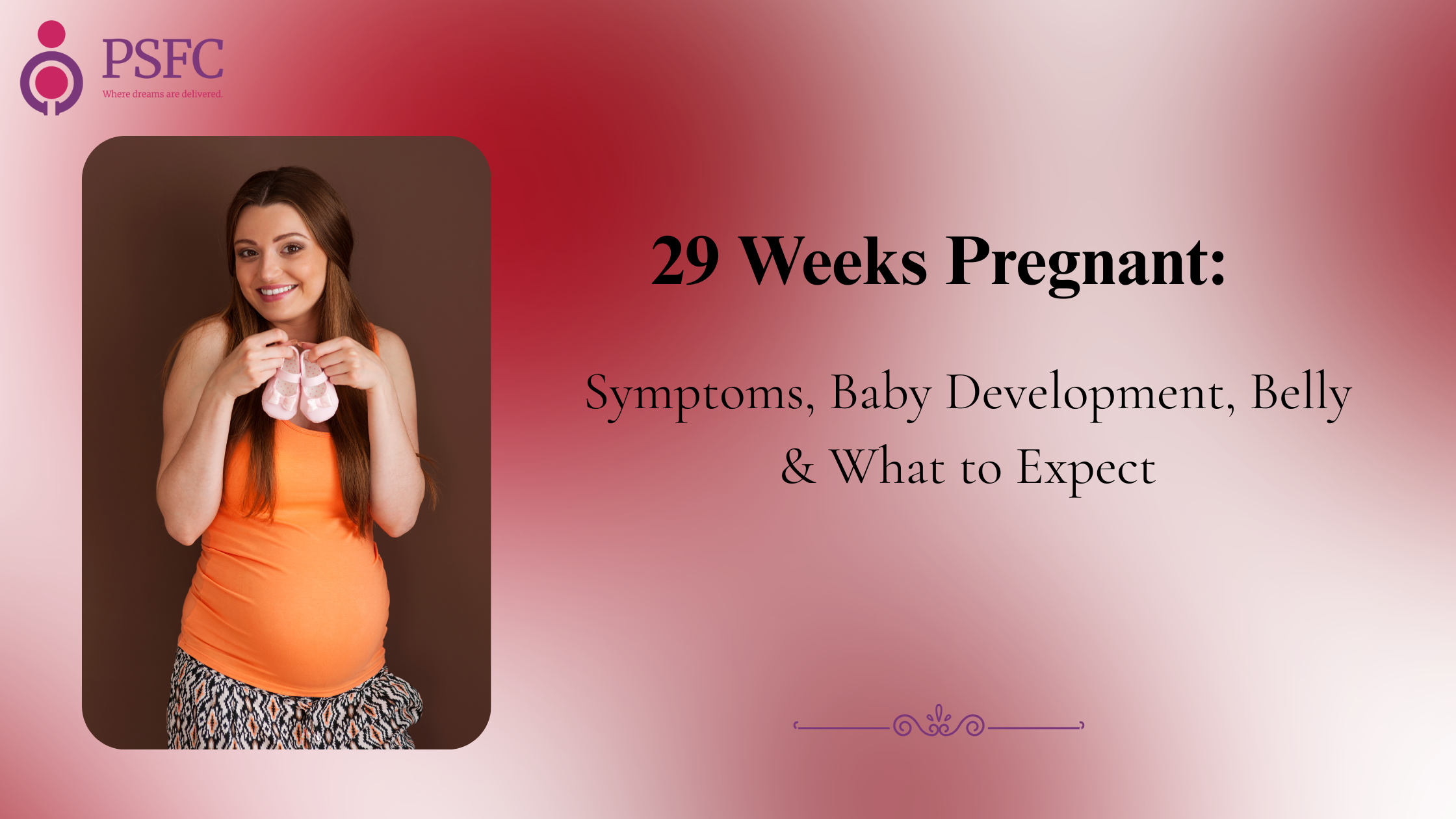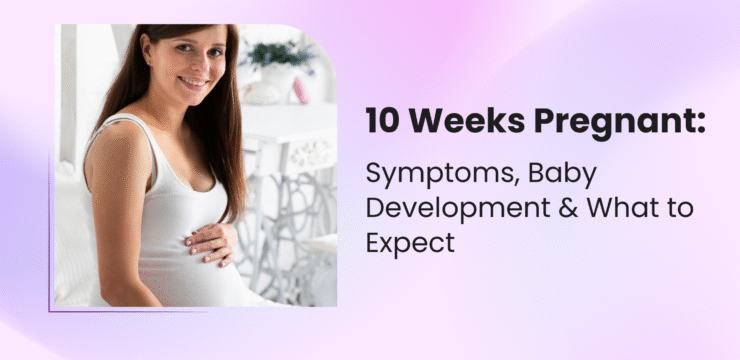At 29 weeks pregnant, you are well into your third trimester and count down to meet your little one! Now, your pregnancy is becoming increasingly real because each day passes; The baby is growing quickly while your body adjusts to carry an extra load and can have new symptoms surface.
This blog will walk you through 29 weeks pregnant symptoms, baby development, belly size expectations, and ultrasound expectations to give an understanding of exactly what to expect during week 29 of gestation. This way, you’ll know exactly what’s ahead!
29 Weeks Pregnant: What to Expect
At 29 weeks, your baby should be approximately the size of a butternut squash, so you may experience stronger kicks, more body changes, and emotional ups and downs as delivery nears. Here’s what to expect: Increase daily infant movement. Increased fatigue occurs as your body works harder to achieve results. Belly growth that interferes with sleeping and daily tasks.
Strengthen the emotional bond with your baby. Frequent doctor’s visits will enable you to track the development and health of your baby.
Common 29 Weeks Pregnant Symptoms
Your body is working overtime to support the development of your baby, which leads to some common 29 weeks pregnant symptoms:
Back Pain – Carrying extra weight strains the back muscles.
Swelling (edema) – Mild swelling of ankles, feet, and hands is common.
Heartburn and Indigestion – When the uterus presses against the stomach, this causes heartburn or indigestion symptoms.
Shortness of breath – As your belly expands, its size crowds the lungs.
Leg cramps – Most frequently experienced at night due to circulation changes.
Braxton Hicks contractions – Mild, irregular contractions that help prepare your body for labor.
Fatigue and Sleep Difficulties – Finding comfort may be harder.
Colostrum Leakage – Some women report yellowish fluid leaking out from under their breasts.
Varicose veins or hemorrhoids are caused by increased blood flow and pressure.
If you experience severe swelling, persistent headaches, or blurry vision accompanied by extreme preeclampsia symptoms – severe swelling, headaches, or blurry vision – it is imperative to contact your physician immediately, as these could be symptoms of preeclampsia.
29 Weeks Pregnant Belly & Bump Size
At 29 weeks pregnant, your belly should become quite prominent. Here’s what to expect with your bump:
Belly Size: With your uterus having grown larger than before, your abdominal size has expanded by about three or four inches above your belly button.
Weight Gain: Since December 2012, most women have gained 8-11 kg, depending on their body type.
Linea nigra: A dark vertical stripe down your belly may be more obvious.
Stretch marks: Over time, stretch marks may become increasingly noticeable due to skin stretching.
Movement: Baby kicks can help others feel easily.
Your belly may sometimes feel tight due to Braxton Hicks contractions or due to your baby adjusting in position.
Is 29 Weeks Considered 7 Months Pregnant?
Yes! In 29 weeks of pregnancy, you conceive for about seven months. In your third quarter, usually up to 28 weeks delivery (around the week), which lasts for about 11 weeks before the date you; However, children sometimes come before or after.
Baby Development at 29 Weeks Pregnant
One of the most exciting parts of 29 weeks pregnant baby development is watching your little one begin to act and look more like a newborn:
Size: This large pet measures 38-40 cm in length and weighs between 1.2 and 1.4 kg.
Skin: Becoming less transparent and beginning to produce fat deposits.
Muscles: Strengthening to enable more powerful kicks and rolls.
Brain: Proliferating billions of nerve cells; cognitive development is rapid.
Eyes: Are now capable of blinking and may react to light outside of the womb.
Lungs: Are still maturing, yet to fully develop, as the baby practices breathing movements.
Movement: If your child is awake or sleeping, you can inspect the pattern in their movements.
Is Week 29 Considered Third Trimester?
Yes, Week 29 marks the official infection in the third quarter and is dedicated to your body for phase development, final development, and labor. When you can experience more physical discomfort at this point in pregnancy, you are getting closer to meeting your little one!
Baby’s Position in the Womb at 29 Weeks
At 29 Weeks of gestation, babies’ positions can vary dramatically due to fetal positioning and growth factors. At 29 weeks pregnant, your baby can assume any position.
Head-down (cephalic position) – Ideal for delivery, but has yet to become fixed in place.
Breech (feet or buttocks first) – Breech deliveries remain common at this stage; many babies turn before 36 weeks of gestation.
Transverse (lying sideways) – Babies may change positions frequently as space allows.
Your doctor may begin paying more attention to the position of your 29-week-old baby in the coming weeks.
29 Weeks Pregnant Baby Size
At 29 weeks of gestation, your baby should roughly resemble the size of a butternut squash.
Length: About 15-15/16 inches (38-40 cm).
Weight: Around 1.2-1.4 kg.
Baby should continue gaining about 200 grams (0.2 kg) each week until delivery.
29 Weeks Ultrasound
The 29 weeks pregnant ultrasound should be performed to:
Baby’s size and growth rate. Amniotic Fluid Levels. Baby’s Heartbeat and Movement. Placenta Health and Position of Baby within the Womb. Some parents opt for a 3D or 4D ultrasound during this stage to gain a clearer picture of their baby’s face and expressions.
Safe Exercises at 29 Weeks Pregnant
Being active helps improve circulation, reduce anxiety, and prepare the body for labor. In 29 weeks, safe practice is included:
Walking is a low-effect exercise that fits easily into daily life.
Swimming – Swimming helps to remove joint pressure and reduce back pain.
Birth Eyes – Improves flexibility, posture, and relaxation during pregnancy.
Pelvic floor (Kegel) exercise – strengthen the muscles required for delivery and postpartum recovery.
Avoid high-risk activities such as heavy lifting, contact sports, or exercise that causes dizziness.
When to Call Your Doctor at 29 Weeks Pregnant
29 weeks pregnant, this is the time to contact your doctor.
If you experience any of these symptoms, contact your doctor immediately:
Heavy vaginal bleeding or fluid leakage. Repeated or severe contractions may indicate predetermined labor. Suddenly, hand, legs, or facial swelling. Serious headaches, vision changes, or dizziness. At least the child is specific about the movements. High fever, chills, or an unexpected discharge. Swift medical intervention ensures that both you and your baby are safe.
FAQs About 28 Weeks Pregnant
1. What should my sleeping arrangements be at 29 weeks pregnant?
Sleep on your left side for optimal blood flow to your baby and use pillows as support if necessary.
2. Can I travel at 29 weeks pregnant?
Will my baby survive if born at 28 weeks pregnant?
Can I feel kicks daily at 29 weeks?
Is 29 weeks too early for labor?
Is 29 weeks too early for labor? Yes, it would be premature, but babies born at this gestation can survive if the delivery takes place early enough.




